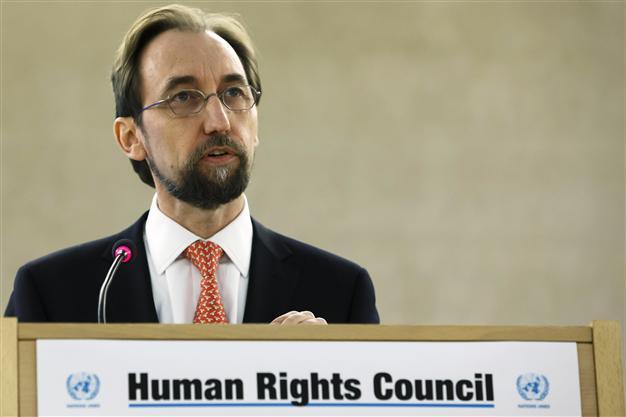UN rights chief denounces surge in albino attacks
GENEVA - Agence France-Presse

UN High Commissioner for Human Rights Zeid Ra'ad al Hussein. AP Photo
The UN human rights chief on March 10 strongly condemned a surge in attacks in east Africa on albinos, whose body parts are often used for witchcraft.The statement came after police in Tanzania arrested seven suspects over a brutal weekend assault in which a six-year-old albino boy's hand was hacked off with a machete.
The UN High Commissioner for Human Rights Zeid Ra'ad Al Hussein "expressed revulsion at a recent surge in violent attacks against people with albinism in several East African countries," the statement said
"These attacks are often stunningly vicious, with children in particular being targeted," Zeid said.
In the past six months, at least 15 people with albinism in Tanzania, Malawi and Burundi have been abducted, wounded, killed or escaped being kidnapped, including three such attacks in the past week alone, his office said.
The violence has left many people with albinism "living in abject fear," Zeid said.
"Some no longer dare to go outside, and children with albinism have stopped attending school because of the recent spate of assaults, murders and kidnappings," he added.
Half the attacks that have taken place since August occurred in Tanzania. Two people were killed, including a one-year-old boy whose arms and legs were hacked off, and one remains missing. Two others had limbs cut off, and one of the victims was gang-raped, the UN said.
Attacks on albinos are often motivated by the use of body parts for witchcraft rituals.
The UN has warned that the surge in Tanzania could be linked to looming general and presidential elections in October 2015, as political campaigners may be turning to influential sorcerers to improve their odds.
Tanzanian authorities imposed a ban on witchcraft in January.
In Burundi, 19 albinos have been killed since 2008.
In Malawi, at least six attacks have been reported in 2015. In one province, "groups of men are reported to be roaming around hunting for people with albinism", the UN said.
Albinism is a hereditary genetic condition which causes a total absence of pigmentation in the skin, hair and eyes. It affects one Tanzanian in 1,400, often as a result of inbreeding, experts say.
















